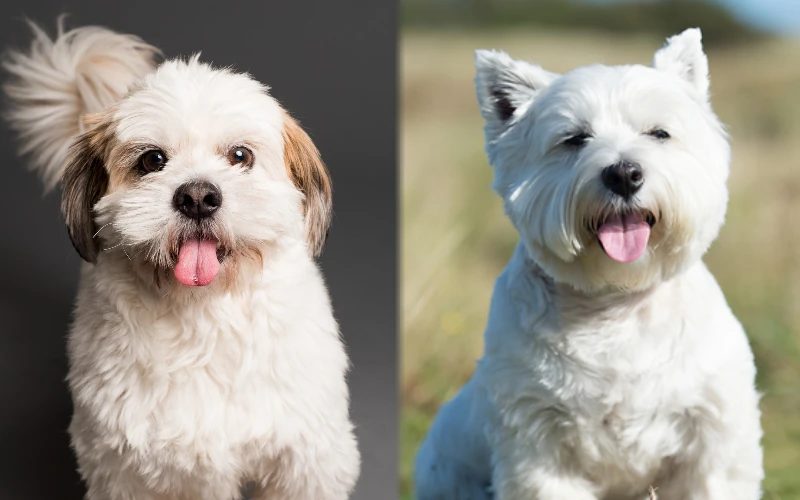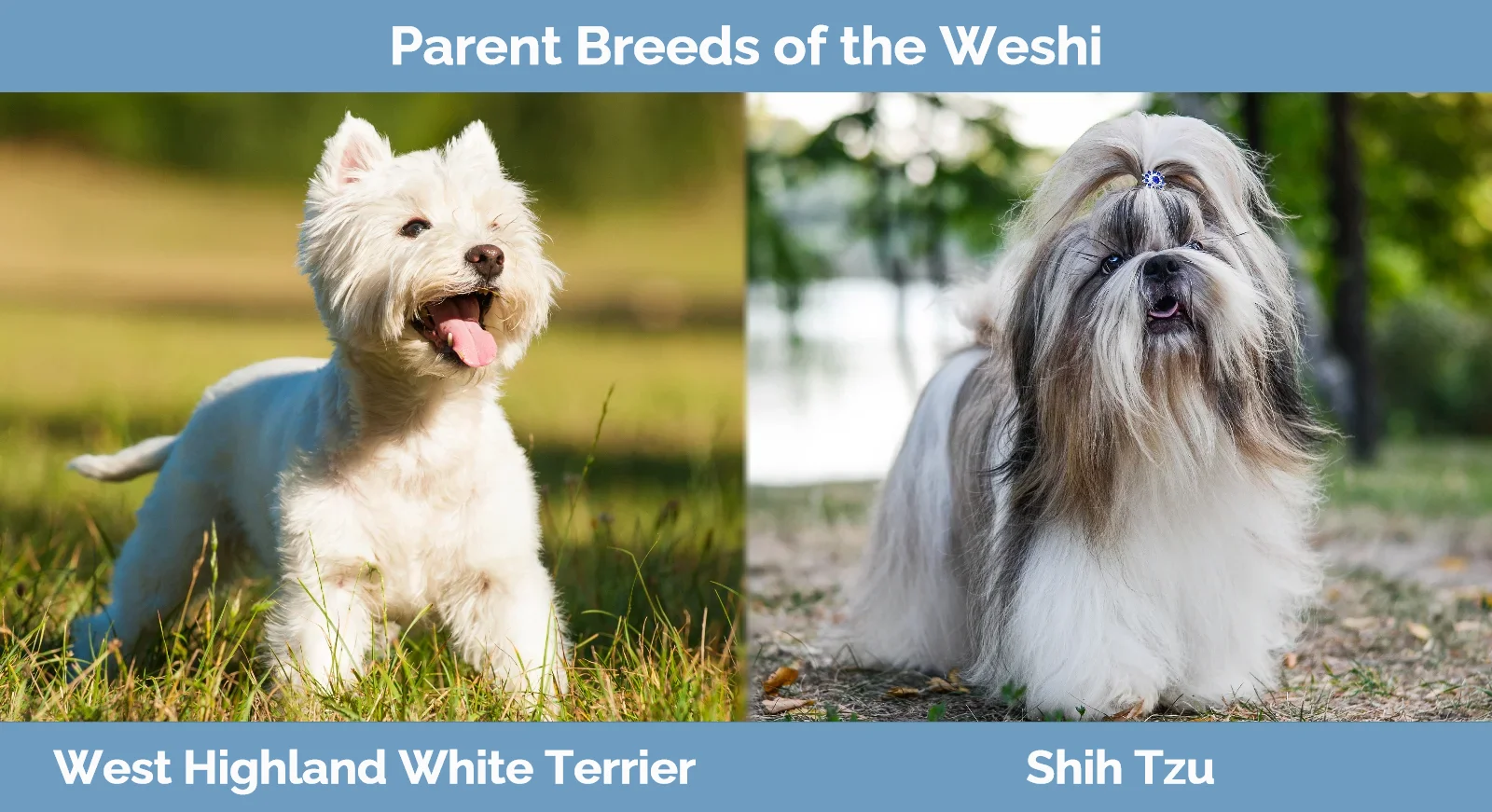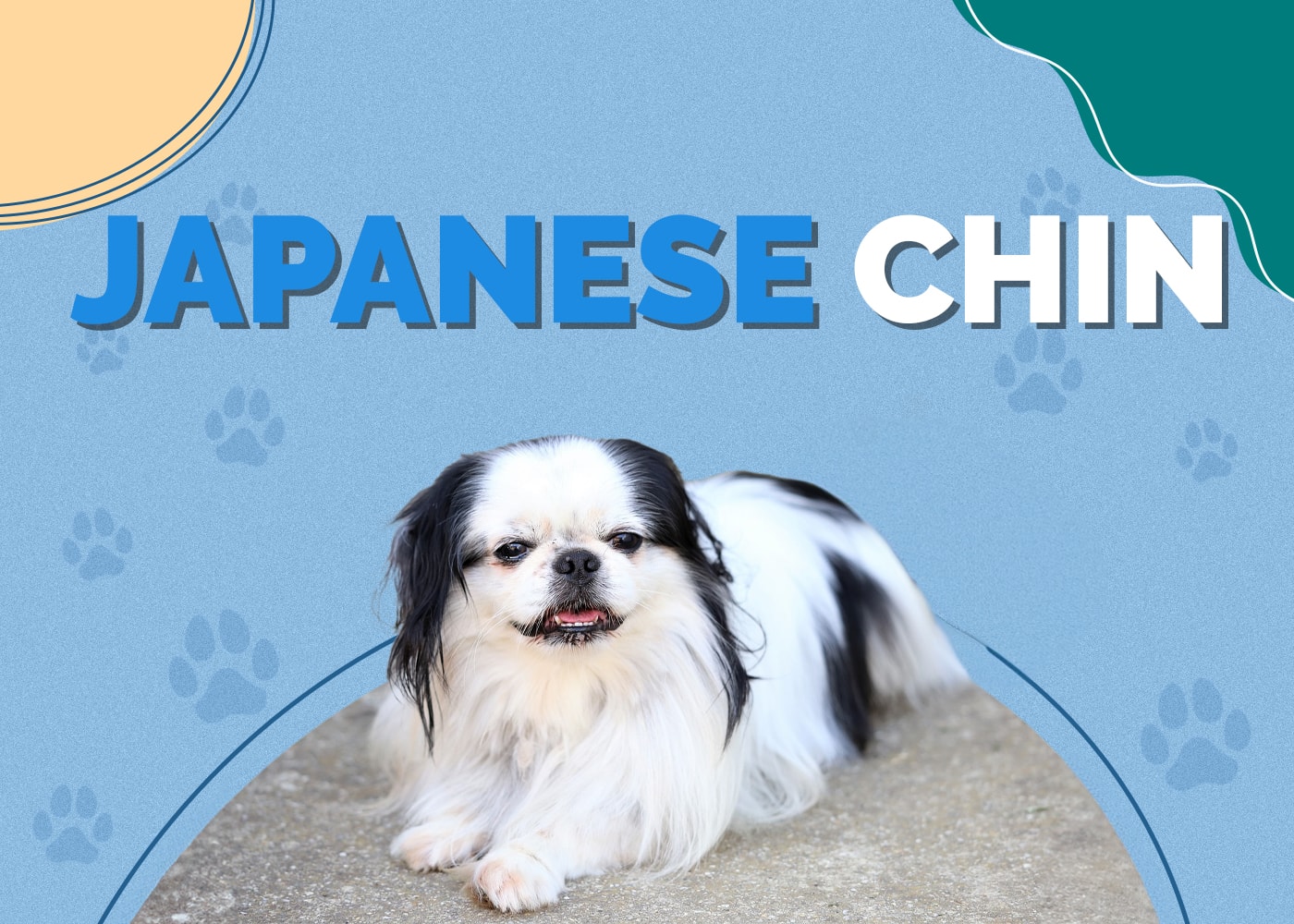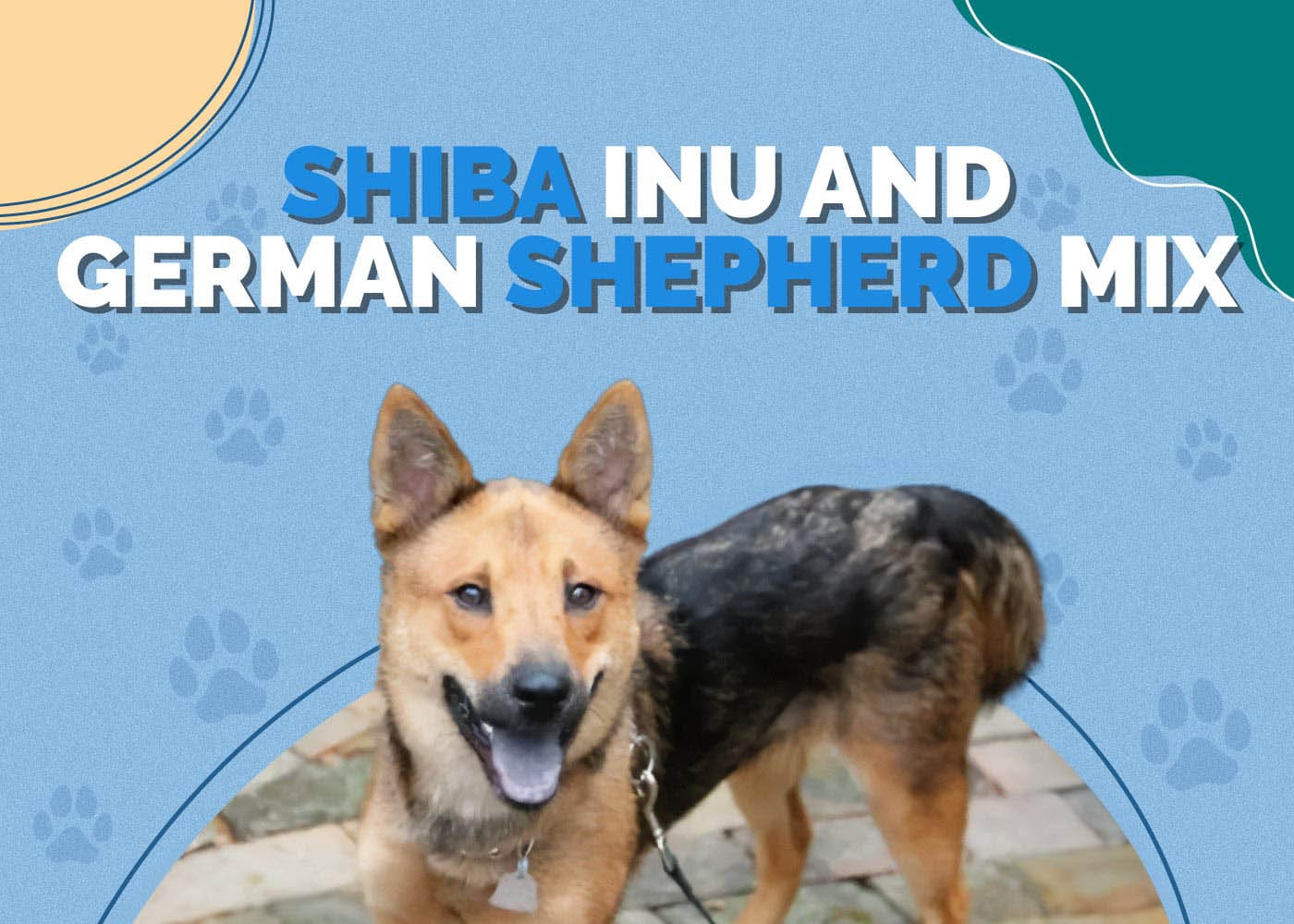Weshi (Shih Tzu & Westie Mix): Pictures, Care Guide, Temperament & Traits
Updated on

Click to Skip Ahead
The Weshi is a unique combination of the West Highland White Terrier (Westie) and the ever-popular Shih Tzu, making it possible for you to own two purebred dogs at once! The Weshi is an affectionate yet spunky dog that can make an excellent companion for many dog lovers.
They also go by Westie Tzus and West Highland Tzus and can do just as well in a home in the country or a condo in the city. The Weshi’s appearance and temperament depend entirely on which parent they take after the most.
| Height: | 8–11 inches |
| Weight: | 16–20 pounds |
| Lifespan: | 12–15 years |
| Colors: | Black, brown, brindle, cream, golden, white |
| Suitable for: | Singles, families with older children living in a house or apartment |
| Temperament: | Social, intelligent, loyal, playful, stubborn, energetic, affectionate |
The Weshi is a solid, stocky little dog with muscular legs. Their coats never get long as the Shih Tzu’s and tend to be short to medium in length. But the color can vary and be a solid color or patterned with brown, white, black, or tan.
While they make wonderful pets for most people, they have a stubborn side and might be challenging for people new to dog ownership.
Weshi Characteristics
Weshi Puppies
Weshi puppies are not the most common crossbreed, so it might be difficult to find one. You can try posting your interest in a Weshi on social media or speaking to Westie and Shih Tzu breeders, as they might know where you can find Weshi puppies.
Once you have found a reputable breeder, you’ll want to meet with them in person so you can take a look at the living conditions of their dogs. This is the best way to avoid purchasing your puppy from a puppy mill. Be sure to ask questions and to see the medical history of their dogs.
Adopting a dog is another possibility to consider. Finding a specific crossbreed like the Weshi might be more challenging, but anything is possible. Keep an eye on your local rescue groups and animal shelters—you might end up giving a dog a new and happy home!

Temperament & Intelligence of the Weshi 🧠
The Weshi is an energetic and loving dog, but their temperament will depend on which parent they take after the most. They are attention-seeking dogs like the Shih Tzu but are also stubborn and feisty like the Westie.
Each individual Weshi will have their own unique personality, but these are generally intelligent and sweet dogs that are people oriented, want to be the center of attention, and will likely become your little shadow.
Are These Dogs Good for Families? 👪
The Weshi can make an excellent dog for families, though older children would be preferable. They are playful and active dogs, but the terrier side of the Weshi might get snappy if younger children play too roughly.
You should teach your children to treat their pets with respect and understand what is right and wrong behavior around the family dog.
Does This Breed Get Along With Other Pets?
With the right socialization, the Weshi can get along with other pets, but they have a reputation for being aggressive toward other dogs of the same sex. The terrier in them makes them incredibly stubborn, and they are unlikely to back down from a fight.
The Weshi also has a high prey drive, which might make it a challenge if you own smaller pets like rabbits and birds.
Things to Know When Owning a Weshi
Food & Diet Requirements 🦴
You should always opt for the highest-quality dog food formulated for your Weshi’s current size, age, and activity level. Don’t give them too many treats and human foods, to avoid obesity or stomach upset.
Speak to your veterinarian about what you should feed your dog, and ensure that they have constant access to fresh and clean water.
Exercise 🐕
The Weshi is an active and energetic dog, but due to their small size, they only need about 30 to 60 minutes of walking and activity daily.
This should include time spent playing with them, providing them with toys for chewing, and keeping them mentally alert, such as with puzzle toys.
If your Weshi has a flat face like their Shih Tzu parent, you’ll want to avoid overexerting them, particularly when it’s hot outside. Aim for cooler parts of the day to get their exercise in.
Training 🎾
Training the Weshi can be challenging, particularly for beginner dog owners. They are intelligent and curious dogs, but that famous terrier stubbornness can be problematic. They require patience and an emphasis on positive reinforcement with a firm yet gentle hand.
Never use harshness toward the Weshi—or any dog—such as yelling or punishment-based training. They are confident dogs with a terrier’s tenacity and a Shi Tzu’s gentle demeanor, which can make for a bumpy road while training.
Grooming ✂️
Grooming your Weshi depends on what kind of coat they end up with. They might have the Shih Tzu’s soft, long hair, the terrier’s wiry hair, or a combination of both.
If your dog has medium to long hair, you’ll want to brush them daily, and if they have short hair, you can brush them two or three times a week.
Many dogs need a bath about every 4 to 6 weeks using a good dog shampoo. Never use human shampoo on your dog, as their skin has a different pH level than ours, and they can get dry and irritated skin. You can also use deodorizing wipes for in-between bath times.
Trim your Weshi’s nails every 3 to 4 weeks, clean their ears about once a week, and brush their teeth two to three times a week.
Health and Conditions ❤️
For the most part, the Weshi are healthy dogs with a long life expectancy of 12 to 15 years. That said, since their parents are purebred, there are several health conditions that the Weshi might inherit.
This is not to say that your Weshi will inherit any of these health conditions. Still, it’s good practice to be familiar with them.
- Atopic dermatitis
- Eye problems
- Periodontal disease
- Ear infections
- Brachycephalic airway syndrome
- Patellar luxation
- Jaw enlargement
- Legg-Calve-Perthes disease
- Copper storage hepatopathy
- Hip dysplasia
- Liver shunts
Male vs. Female
Like most dog breeds, the female Weshi is typically smaller and lighter than the male. The other significant difference between the two is when it’s time for surgery: the male will need neutering and the female will need spaying. This will change their behavior to a certain degree beyond preventing pregnancy. It will reduce aggressive tendencies and even avoid potential health conditions in the future.
Temperament-wise, though, there is no difference between female and male Weshis. Any differences can usually be attributed to upbringing, training, and socialization.
3 Little-Known Facts About the Weshi
1. The Weshi can be easy or difficult for new dog parents
So much depends on which parent the Weshi takes after most. If they are closer to their Shih Tzu parent in temperament, they might be easy to train, but if they are more like their Westie parent, they will likely be stubborn and snappy. Terriers don’t hesitate to let you know if they aren’t happy about something!
2. The mothers of the Weshi are almost always Westies
Since the West Highland White Terrier is larger than the Shih Tzu, the mother is typically the Westie. The litter size is usually between three and five puppies.
3. The history of the Weshi is unknown
Certain mixed breeds have specific histories in which the dates and breeders are known. But this is not the case for the Weshi. It’s believed that they originated in the United States about 20 years ago. But beyond this, their beginnings are a mystery.
Final Thoughts
The Weshi might not be for everyone, but with the right family, they are excellent companions. They are friendly and loving dogs that definitely have strong personalities.
As long as you give them enough socialization (which you can still do even if you’ve adopted an adult) and the right training, you’ll have yourself a wonderful pet!
Featured Image Credit: Left – Goochie Poochie Grooming, Pexels | Right – rebeccaashworth, Shutterstock














